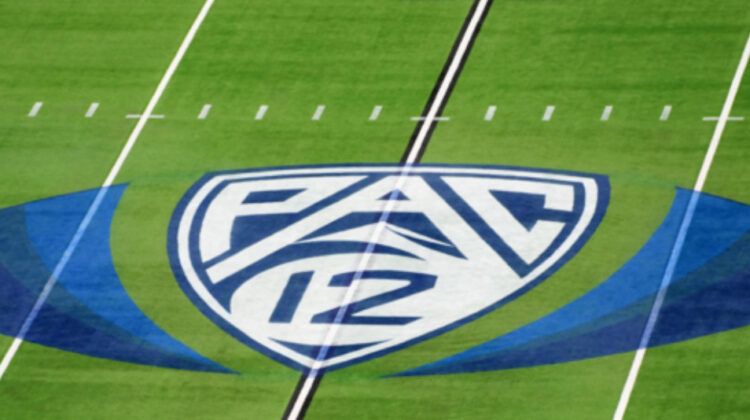The future of a 108-year-old college athletic conference could be determined in the next 24 hours as the Pac-12’s existential crisis reaches its tipping point.
On Tuesday morning, Commissioner George Kliavkoff presented a media rights proposal to the nine remaining university presidents for approval, concluding a saga that began last summer when the Los Angeles schools announced their departure to the Big Ten in 2024.
But how will it end?
If the proposal carries satisfactory revenue and media partners, the schools are expected to plow forward together for the remainder of the decade, perhaps with replacements for the three outgoing members, USC, UCLA and Colorado.
If Kliavkoff is unable to secure a media deal that satisfies the presidents, the conference as we know it would cease to exist.
As many as three schools could join the Big 12, which is currently targeting Arizona but is believed to desire Arizona State and Utah, as well.
That would leave six in limbo: Stanford, Cal, Oregon, Oregon State, Washington and Washington State.
At that point, with the so-called Four Corners schools gone, the six West Coast universities would have two options:
— They could attempt to reform the conference, in a lesser form, with the aid of expansion. San Diego State likely would be the top choice, along with SMU and perhaps Colorado State. But the options are few, largely because of the paucity of schools west of the Rockies. Of the 10 conferences that play major college football, only two are located in the Mountain and Pacific Time Zones.
— Oregon, Washington and perhaps the Bay Area duo could attempt to join the Big Ten and form a West Coast division that would include USC and UCLA. However, that scenario likely would require the quartet to enter the Big Ten with reduced revenue shares compared to the 16 existing members. And it would leave Washington State and Oregon State with no home.
Both scenarios would result in the schools facing massive resource deficits relative to their competition in other Power Five conferences, thereby impacting the competitive experience for their athletes in all sports.
Because football generates the revenue used to support Olympic sports teams, anything that undermines success on the field (for example, smaller budgets for recruiting and coaching staff salaries) has ramifications for the Olympic sports.
While ticket sales and philanthropy provide vital dollars for any athletic department, the media rights deal often serves as the foundation for annual revenue.
The Pac-12’s current deal, which began in 2012-13, expires next summer and pays an average of $20.8 million per school over the term. The benchmark for the new agreement is approximately $31 million, which would mirror the deal signed by the Big 12 last fall.
In addition to the valuation level, the current Pac-12 schools are anxious to see which media partners are involved. While there could be a streaming component (Amazon or Apple), the presidents are believed to desire a strong presence on linear television (ESPN).
Neither the valuation or the media partners in the next contract cycle was viewed as a challenge for the conference until USC and UCLA opted to leave the Pac-12 for membership in the Big Ten starting next summer.
With the loss of its top football (USC) and basketball (UCLA) brands and the massive L.A. media market, the conference entered an existential crisis that could have remained unresolved well into August.
But Colorado’s departure to the Big 12, announced last week, expedited Kliavkoff’s timeline for presenting the presidents with a contract offer.
Will it compare favorably with the Big 12’s figure?
How deeply will it interlock the Pac-12 with the sports streaming giants, Apple and Amazon?
To what extent will ESPN and other linear networks be involved?
How many night games will be included?
Media deals are complicated arrangements for conferences, particularly when new partners are involved. The Pac-12’s negotiations have dragged on longer than expected.
Resolution should come this week, with the future of the conference in the balance.
*** This article will be updated if news develops.
*** Send suggestions, comments and tips (confidentiality guaranteed) to pac12hotline@bayareanewsgroup.com or call 408-920-5716
*** Follow me on Twitter: @WilnerHotline
*** Pac-12 Hotline is not endorsed or sponsored by the Pac-12 Conference, and the views expressed herein do not necessarily reflect the views of the Conference.
Related posts:
 Hotline mailbag – On the “big bias” with ESPN, the Pac-12’s low bid total, Kriisa’s injury, Fox and Haase remain in place and more
Hotline mailbag – On the “big bias” with ESPN, the Pac-12’s low bid total, Kriisa’s injury, Fox and Haase remain in place and more 
(AP Photo/Jeff Chiu)
Stock report: Pac-12 survival, options for Oregon and UW, the Big 12 as hunter, Scott’s legacy and more
(AP Photo/Ralph Freso, File)
Wilner Hotline – Pac-12 survival guide: The strategic merits of an alliance (or merger) with the Big 12
(AP Photo/Ralph Freso, File)
Wilner Hotline – Presidential Power Index: Which Pac-12 presidents have the greatest influence over the conference’s future
